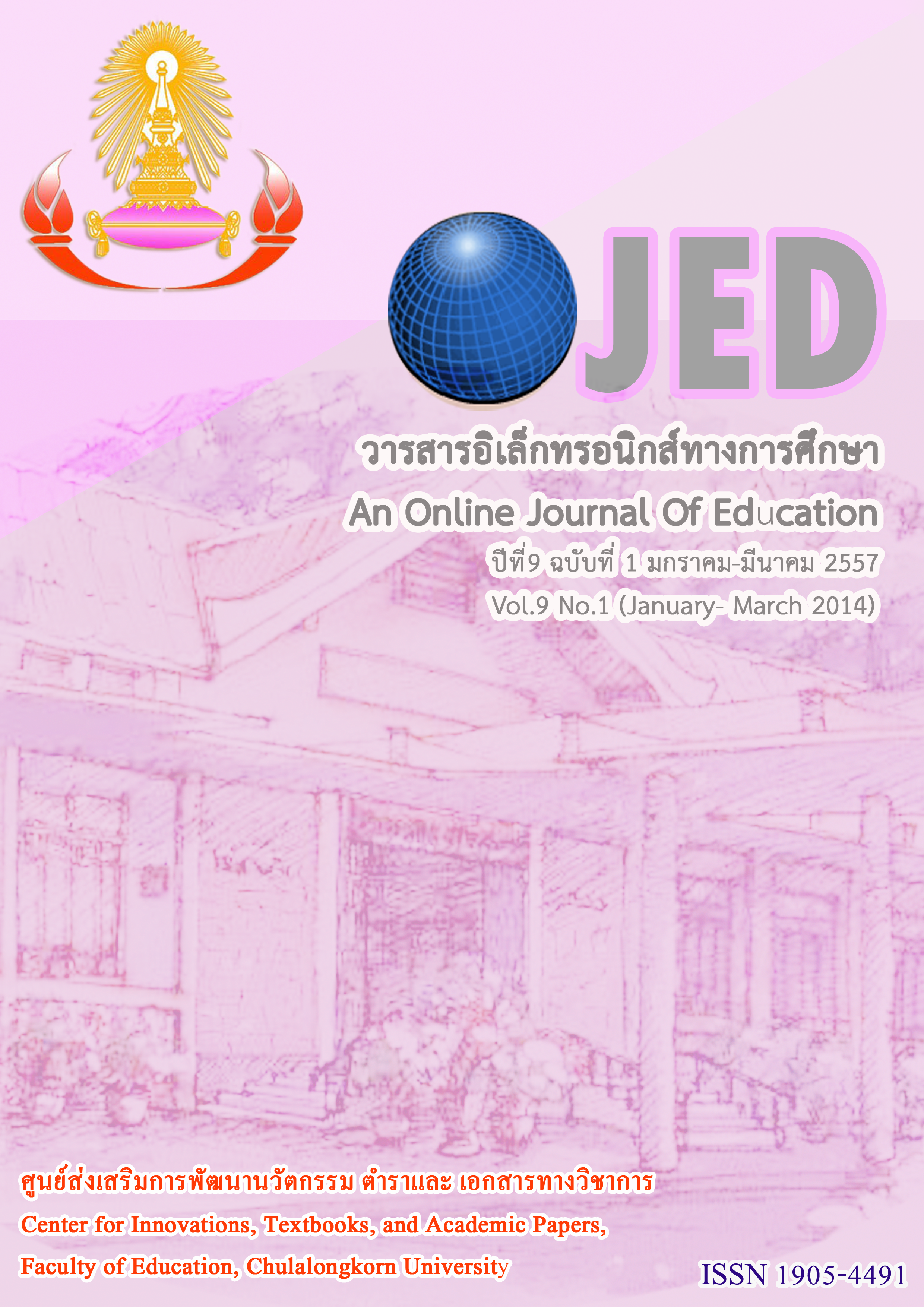การเขียนบันทึกเพื่อพัฒนาผลสัมฤทธิ์ทางการเรียนและเจตคติต่อการเรียนวิชาคณิตศาสตร์ ของนักเรียนชั้นมัธยมศึกษาตอนต้น: การวิเคราะห์พัฒนาการ
Keywords:
การเขียนบันทึก, ผลสัมฤทธิ์ทางการเรียน, เจตคติต่อการเรียนวิชาคณิตศาสตร์, การวิเคราะห์พัฒนาการ, JOURNAL WRITING, ACHIEVEMENT, ATTITUDE, DEVELOPMENTANALYSISAbstract
การวิจัยในครั้งนี้มีวัตถุประสงค์เพื่อ 1) ศึกษาผลการใช้การเขียนบันทึกในการพัฒนาผลสัมฤทธิ์ทางการเรียนคณิตศาสตร์และเจตคติต่อการเรียนวิชาคณิตศาสตร์ของนักเรียนชั้นมัธยมศึกษาตอนต้น 2) วิเคราะห์พัฒนาการของผลสัมฤทธิ์ทางการเรียนคณิตศาสตร์และเจตคติต่อการเรียนวิชาคณิตศาสตร์ของนักเรียนชั้นมัธยมศึกษาตอนต้น เป็นการวิจัยกึ่งทดลองแบบอนุกรมเวลา ตัวอย่างวิจัยเป็นนักเรียนชั้นมัธยมศึกษาปีที่ 2 จานวน 108 คน เครื่องมือที่ใช้ในการวิจัย ได้แก่ 1) แบบเขียนบันทึกในวิชาคณิตศาสตร์ 2) แผนการจัดการเรียนรู้สาระการเรียนรู้คณิตศาสตร์ 3) แบบทดสอบผลสัมฤทธิ์ทางการเรียนคณิตศาสตร์ แบบคู่ขนาน จานวน 5 ฉบับ มีค่าความยากเฉลี่ยอยู่ระหว่าง 0.488–0.528 ค่าอานาจจาแนกเฉลี่ยอยู่ระหว่าง 0.396–0.413 ค่าความเที่ยงอยู่ระหว่าง 0.869 – 0.890 4) แบบวัดเจตคติต่อการเรียนวิชาคณิตศาสตร์ มีค่าความเที่ยงเท่ากับ 0.933 5) แบบสัมภาษณ์ความพึงพอใจต่อการใช้การเขียนบันทึก และ 6) แบบสังเกตพฤติกรรมในชั้นเรียน การวิเคราะห์ข้อมูล โดยใช้สถิติบรรยาย ประกอบด้วยค่าร้อยละ ค่าเฉลี่ย ค่าส่วนเบี่ยงเบนมาตรฐาน ค่าความเบ้ และค่าความโด่ง สถิติสรุปอ้างอิงประกอบด้วย การเปรียบเทียบค่าเฉลี่ยเลขคณิต โดยใช้สถิติทดสอบที (t-test) และวิเคราะห์ความแปรปรวนแบบวัดซ้า (Repeated measure ANOVA) สาหรับการเก็บรวบรวมข้อมูลเชิงคุณภาพ ใช้วิธีการสัมภาษณ์นักเรียนกลุ่มทดลอง พร้อมทั้งการสังเกตพฤติกรรมในชั้นเรียน วิเคราะห์ข้อมูลเชิงคุณภาพโดย การวิเคราะห์เนื้อหา (Content analysis)
ผลการวิจัยสรุปได้ดังนี้ 1) ผลการใช้การเขียนบันทึก พบว่า กลุ่มทดลองมีระดับผลสัมฤทธิ์ทางการเรียนสูงขึ้นอย่างมีนัยสาคัญทางสถิติที่ระดับ .05 และกลุ่มทดลองกับกลุ่มควบคุมมีระดับผลสัมฤทธิ์ทางการเรียนและเจตคติต่อการเรียนวิชาคณิตศาสตร์แตกต่างกันอย่างไม่มีนัยสาคัญทางสถิติที่ระดับ .05 2) กลุ่มทดลองและกลุ่มควบคุมมีพัฒนาการผลสัมฤทธิ์ทางการเรียนและเจตคติต่อการเรียนวิชาคณิตศาสตร์แตกต่างกันอย่างไม่มีนัยสาคัญทางสถิติที่ระดับ .05 โดยกลุ่มทดลองมีพัฒนาการผลสัมฤทธิ์ทางการเรียนเพิ่มขึ้น 43.921 ของปริมาณผลสัมฤทธิ์ที่ควรพัฒนาได้ ในขณะที่กลุ่มควบคุม มีพัฒนาการผลสัมฤทธิ์ทางการเรียนเพิ่มขึ้นร้อยละ 44.878 ของปริมาณผลสัมฤทธิ์ที่ควรพัฒนาได้ และกลุ่มทดลองมีคะแนนพัฒนาการเจตคติต่อการเรียนเพิ่มขึ้นร้อยละ 3.622 ของปริมาณเจตคติที่ควรพัฒนาได้ ในขณะที่กลุ่มควบคุมมีคะแนนพัฒนาการเจตคติต่อการเรียนเพิ่มขึ้นร้อยละ 2.591 ของปริมาณเจตคติที่ควรพัฒนาได้
This research aimed to 1) study the using journal writing for enhancing achievement and attitude towards Mathematics learning of lower secondary school students, and 2) analyze growths of achievement and attitude towards Mathematics learning of lower secondary school students of students. This research employed a time-series semi-experimental design. Research sample consisted of 108 lower secondary school students.
Research instruments were 1) a Mathematics journal writing form; 2) a Mathematics lesson plan; 3) five parallel forms of a Mathematics achievement test with the average difficulty levels ranged between 0.488-0.528, the average discrimination levels ranged between 0.396-0.413, and the average reliability coefficients ranged between 0.869-0.890; 4) an attitude towards Mathematics inventory with the overall reliability coefficient was 0.935; 5) an interview protocol regarding the satisfaction in journal writing; and 6) a behavior-in-classroom observation form. Data were analyzed quantitatively by descriptive statistics including percent, mean, standard error, skewness and kurtosis; as well as inferential statistics including t-test and repeated measure ANOVA. On the other hand, qualitative data were collected by informal interviews for the experimental group and analyzed by using content analysis. Results can be summarized as follows: 1) The experimental group gained higher mathematics learning achievement with a statistically significant at the level of .05. However, the differences in mathematics achievement and attitude towards mathematics between the experimental and control groups were not statistically significant at the level of .05. 2) The experimental group and the control group had different growths in mathematics learning achievement and attitudes toward Mathematics learning without statistically significant at the level of .05. The experimental group gained higher mathematics achievement by 43.921 % of the expected growths in achievement, whereas the control group had gained higher mathematics achievement by 44.878 % of the expected growths in achievement. The experimental group had increased attitude towards Mathematics learning by 3.622 % of the expected growths in attitude, and the control group had increased 2.591 % of the expected growths in attitude.




